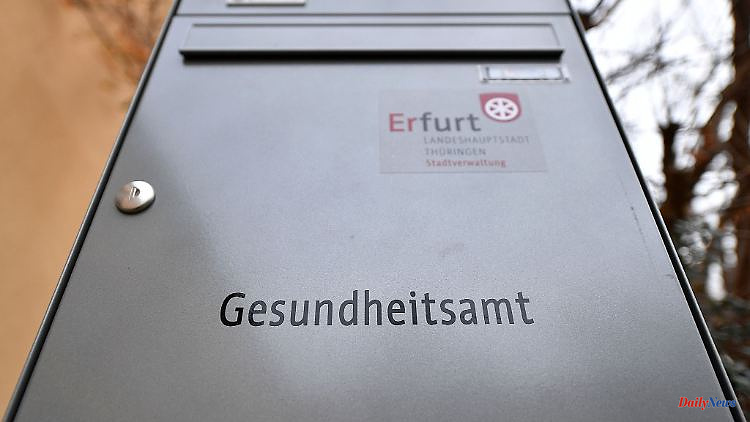During the corona pandemic, the health authorities in Thuringia were massively increased in terms of staff. Most of the employees at that time are no longer working there. But that doesn't apply to everyone.
Erfurt (dpa/th) - After the corona pandemic subsided, the health authorities in Thuringia employed significantly fewer people than at the height of the crisis. At that time, additional staff was sent to the municipal offices, primarily to track contacts. "The staff supplied has been reduced to 100 percent," said a spokeswoman for the Weimar city administration of the German Press Agency. In particular, the employees of external service providers, freelancers and the so-called RKI scouts are no longer employed in the city's health department.
Some of the employees who were once additional have now successfully applied for other positions in the municipal administrations and would now work there, according to reports from Weimar, the district of Nordhausen and Erfurt. In the Thuringian state capital, this affects four workers, said a spokeswoman for the city administration. "They now work as permanent employees in the health department and in the social welfare office."
During the peak phase of the corona pandemic, the municipal health authorities were reinforced with additional staff. This should ensure that they can trace as many chains of infection as possible and thus prevent subsequent infections. In addition to Bundeswehr soldiers, for example, people who were wanted by the Federal Office of Administration on behalf of the Robert Koch Institute (RKI) were also hired. They had helped the health authorities to identify contact persons for those who had tested positive. Employees from other municipal areas were also temporarily sent there.
The example of the Jena city administration makes it clear how many additional employees strengthened the health departments at the time: According to the information, 30 employees worked in the local health department before the pandemic. During the high phase of the pandemic, around 60 women and men worked there - plus other staff who, among other things, issued quarantine certificates. The Jena health department currently has 45 employees.
The situation in the Nordhausen district office was similar. “To ensure contact tracing during the corona pandemic, up to 20 additional temporary employees were temporarily employed,” said a spokeswoman. In addition, employees from other areas of administration had come.
According to the administrations, no layoffs were announced in the health authorities when the workforce was reduced after the pandemic. "There were no layoffs," said a spokeswoman for the Gera city administration. Rather, fixed-term contracts were not extended and employees from other parts of the administration returned to their former jobs.
Although Corona is no longer a huge challenge for employees in the health authorities, several administrations have said that the workload there is still high. Among other things, they are now intensively involved in examining mostly Ukrainian refugees for tuberculosis, according to Weimar. In addition, there are a large number of official medical examinations that have been postponed during the pandemic.












